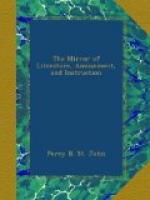“With drink-off’rings and
locks of hair we must,
According to his will, his tomb
adorn.”
It was likewise customary to perfume the grave-stones with sweet ointments, &c.
P.T.W.
* * * * *
Song.
(For the Mirror.)
I’ve roam’d the thorny path
of life,
And search’d abroad
to find.
Amid the blooming flowers so rife,
That germ called peace of
mind.
At length a lovely lily caught
My anxious, longing view,
With all the sweets of “Heartsease”
fraught,
That fragrant flower was you.
Thy smile to me is Heaven divine,
Thy voice the soul of Love—
In pity, then, sweet maid, be mine,
My “heartsease”
flow’ret prove.
Nor wealth nor power would I attain,
Though uncontrolled and free—
All other joys to me are pain,
When sever’d, love,
from Thee.
ELFORD.
* * * * *
Charles Brandon, afterwards duke of Suffolk.
(For the Mirror.)
An event in the life of this nobleman gave Otway the plot for his celebrated tragedy of “The Orphan,” though he laid the scene of his play in Bohemia. It is recorded in the “English Adventures,” a very scarce pamphlet, published in 1667, only two or three copies of which are extant. The father of Charles Brandon retired, on the death of his lady, to the borders of Hampshire. His family consisted of two sons, and a young lady, the daughter of a friend, lately deceased, whom he adopted as his own child.
This lady being singularly beautiful, as well as amiable in her manners, attracted the affections of both the brothers. The elder, however, was the favourite, and he privately married her; which the younger not knowing, and overhearing an appointment of the lovers to meet the next night in her bed-chamber, he contrived to get his brother otherwise employed, and made the signal of admission himself, (thinking it a mere intrigue.) Unfortunately he succeeded.
On discovery, the lady lost her reason, and soon after died. The two brothers fought, and the elder fell. The father broke his heart a few months afterwards. The younger brother, Charles Brandon, the unintentional author of all this family misery, quitted England in despair, with a fixed determination of never returning.
Being abroad for several years, his nearest relations supposed him dead, and began to take the necessary steps for obtaining his estates; when, roused by this intelligence, he returned privately to England, and for a time took obscure lodgings in the vicinity of his family mansion.




